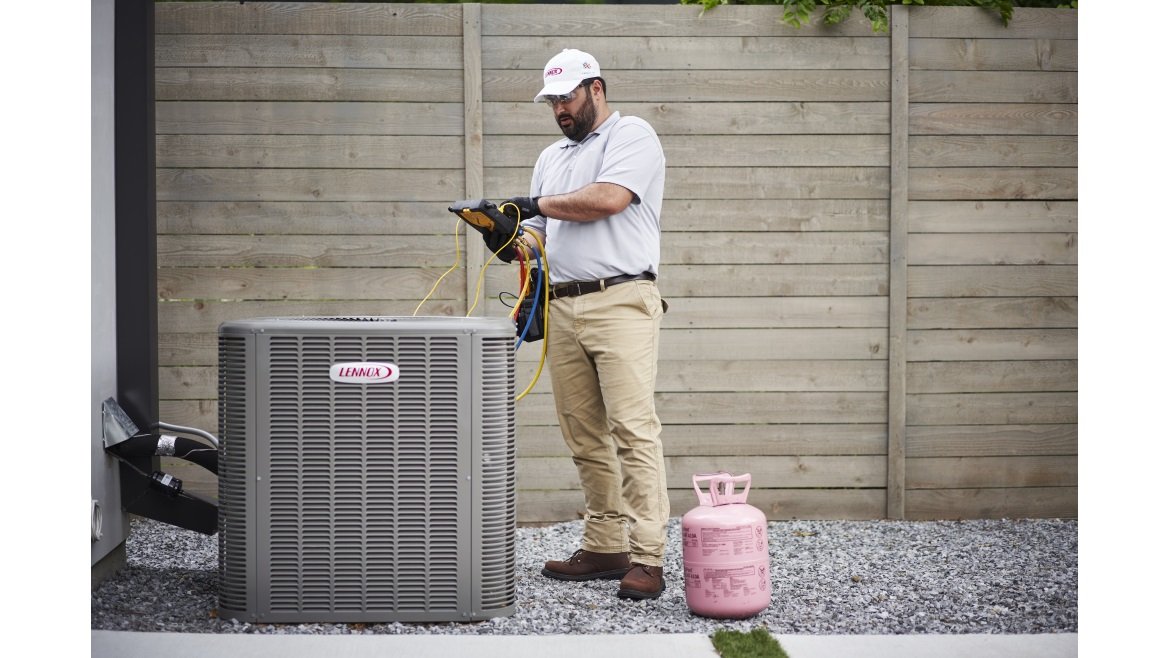How Does a Heat Pump Work in Winter?
Enjoy innovation in every season with precise, quietly efficient Lennox® heat pumps that keep your life simply perfect.
When winter comes knocking on your door, keeping your home warm and cozy becomes a top priority. But have you ever wondered how your heating system, particularly a heat pump, manages to keep you toasty even in freezing temperatures? In this blog post, we'll dive into the world of heat pumps, answering the burning questions: Do heat pumps work in cold weather? And, how does a heat pump work in winter? So, grab a warm cup of cocoa, sit back, and let's explore the science behind heating your home with Miller's Heating & Air.
What Is a Heat Pump?
Before we delve into how heat pumps work in winter, let's make sure we're all on the same page about what a heat pump actually is. Think of a heat pump as a magician that can create warmth even when it's cold outside. It's a device that can both heat and cool your home, which makes it incredibly versatile. Here are the basics:
A heat pump is like a two-way street for heat. It can move heat into your home to warm it up during the winter and remove heat from your home to cool it down in the summer.
Instead of generating heat like a traditional furnace, a heat pump works by transferring heat from one place to another. This means it's more energy-efficient and environmentally friendly.
Now that we're acquainted with the star of the show, let's move on to the main question: Can heat pumps handle the winter chill?
Do Heat Pumps Work in Cold Weather?
Yes, heat pumps can work in cold weather, but they have their limits. Here's what you need to know:
The Sweet Spot: Heat pumps work most efficiently in mild to cool temperatures. They are highly efficient at temperatures between 40°F (4°C) and 60°F (15°C). In this range, they can keep your home comfortable while using minimal energy.
When It Gets Colder: As the outside temperature drops below 40°F (4°C), the heat pump becomes less efficient. It has to work harder to extract heat from the outdoor air, which means it uses more electricity. However, modern heat pumps are equipped with advanced technology that allows them to work efficiently even in colder weather.
Supplemental Heating: In areas with harsh winters, heat pumps are often paired with a backup heat source, like electric resistance heaters or a furnace. When it's extremely cold outside, these backup systems kick in to provide additional warmth, ensuring your home stays cozy.
How Does a Heat Pump Work in Winter?
Now, let's unravel the mystery of how a heat pump manages to keep your home warm when the mercury drops.
Refrigeration Cycle: At the heart of a heat pump's operation is the refrigeration cycle. This cycle involves the circulation of a special refrigerant fluid through a series of components.
Outdoor Unit: The outdoor unit of a heat pump contains a compressor. When you set your thermostat to a higher temperature, the heat pump's compressor starts working. It compresses the refrigerant, raising its temperature.
Heat Exchange: The hot refrigerant is then sent through coils in the outdoor unit. Even in cold weather, there is still some heat energy in the outdoor air. The refrigerant absorbs this heat energy and evaporates, turning it into a gas.
Indoor Unit: The now-gaseous refrigerant is pumped into the indoor unit of the heat pump. There, it passes through a coil, and as it does, it releases the heat it absorbed from the outdoor air. This warmth is then distributed throughout your home via a fan.
Repeat Process: The refrigerant, now in a low-pressure state, goes back to the outdoor unit, where the cycle begins anew. It continually absorbs heat from the outdoor air and releases it inside your home.
Efficiency in Cold Weather
To maintain efficiency even in chilly conditions, heat pumps incorporate several features:
Defrost Mode: When frost forms on the outdoor unit's coils, a heat pump switches to defrost mode. During this cycle, the system temporarily reverses, allowing the outdoor coil to warm up and melt the frost. This ensures the heat pump can keep operating effectively.
Variable-Speed Technology: Many modern heat pumps have variable-speed compressors. These can adjust their output to match the heating requirements, which improves efficiency and comfort.
Supplemental Heat: As mentioned earlier, some heat pumps have backup heating elements. These can provide extra warmth when needed, ensuring your home stays cozy even on the coldest days.
So, do heat pumps work in cold weather?
Yes, they do, and they do it surprisingly well. By harnessing the magic of the refrigeration cycle and using advanced technology, heat pumps can keep your home warm, even when winter is at its harshest. However, in extremely cold climates, they may benefit from a little backup assistance.
At Miller's Heating & Air, we understand the ins and outs of heat pumps and can help you choose the right system for your home's unique needs. With the right equipment and regular maintenance, you can enjoy the comfort and energy efficiency that heat pumps offer all year round, whether it's a frosty winter day or a scorching summer afternoon. Stay warm, stay cool, and stay comfortable with Miller's Heating & Air!
Types of Heat Pumps
There are several types of heat pumps, each with its own unique advantages. Two common categories are air source heat pumps and ground source heat pumps, often referred to as geothermal heat pumps. Air source heat pumps, as the name suggests, extract heat from the outdoor air. This makes them versatile and suitable for most regions, as they can work efficiently in both heating and cooling modes, acting as both a heating and air conditioning system. Ground source heat pumps, on the other hand, tap into the stable temperature of the earth beneath the surface, offering highly efficient heating and cooling. They are particularly attractive for those looking to maximize energy savings and reduce their reliance on fossil fuel-based heating systems like gas furnaces.
Installing a Heat Pump
Thinking of installing a heat pump for your HVAC system? It's a wise choice for achieving energy savings and creating an efficient heating and cooling system. The installation typically involves both an indoor and outdoor unit. The outdoor unit, equipped with the compressor and coils, is responsible for absorbing and releasing heat to and from the outdoor air. The indoor unit, connected to your ductwork, distributes the conditioned air throughout your home. In some cases, especially in colder climates, electric resistance heating or a gas furnace can supplement the heat pump's work in extreme cold weather, ensuring your comfort all year round. Whether you have a baseboard heater or a traditional HVAC system, integrating a heat pump can significantly boost the efficiency of your heating and cooling system while reducing your reliance on fossil fuels.
Do I Have a Heat Pump?
If you're unsure whether your home is equipped with a heat pump, a simple way to check is to inspect your thermostat settings. Look for options like "heat," "cool," and "heat pump." If you see "heat pump" as an option, then you likely have one in your home.
Another clue that you might have a heat pump is if your heating bills are lower than those of friends or neighbors who use traditional furnaces. Heat pumps are renowned for their energy efficiency and can help you save money on heating costs.
What Does a Heat Pump Look Like?
Heat pumps typically have an outdoor unit that resembles an air conditioner, featuring a metal box with fins and a fan on top. The indoor unit varies in appearance but often resembles a furnace or an air handler, designed to distribute warm air throughout your home.
To identify what a heat pump looks like, you can also look for connecting pipes or wires between the outdoor and indoor units. These components play a vital role in transferring heat between the two units, making the heat pump system work efficiently.
How Do I Know If I Have a Heat Pump?
If you're still uncertain about whether you have a heat pump, consider consulting a heating and cooling professional. They can inspect your system and provide expert guidance to confirm if your home is heated by a heat pump.
Additionally, you can observe your heating system during very cold weather. Heat pumps often have a defrost cycle that activates in such conditions. If you notice this happening, it's another strong indication that you have a heat pump in your home.




